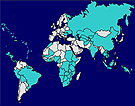CDC - A Partner in the Global Fight against HIV/AIDS

Through the President's Emergency Plan for AIDS Relief (PEPFAR), the U.S. Centers for Disease Control and Prevention (CDC) provides critical leadership in the fight against HIV/AIDS in resource-constrained countries assisting to strengthen laboratory, epidemiology, surveillance, public health evaluation and workforce capacity-essential components for strong sustainable public health systems.
CDC's highly trained epidemiologists, medical officers, public health advisors, human resource specialists, engineers, behavioral scientists, and laboratory scientists have extensive global and domestic public health practice and research experience and a shared commitment to improving health around the world. Working together and with national and international partners, these experts contribute their knowledge to tackle the many facets of the HIV/AIDS pandemic.
Partnering to improve public health systems and services
CDC's public health professionals work hand-in-hand with Ministries of
Health to support them in improving public health policies, services, and
capacity and bring knowledge gained from U.S. and global public health
science and practice to the international community. These strong
partnerships with Ministries of Health and other public health institutions
are based on mutual respect, joint mission, and a shared long-term vision of
sustainable institutional capacity.
Its strong presence on the ground around the world allows CDC to provide broader technical support in areas such as assuring quality of labs, drugs, and clinical services. In addition, CDC staff members in the field are often called to help countries respond to public health emergencies, such as the tsunami in Southeast Asia, the outbreak of Marburg virus in Angola, or avian influenza in Nigeria.
CDC advances the global public health evidence base through production of scientific resources and collaborative work with normative public health institutions. CDC staff contributes to a range of scientific and technical resources that inform public health practice in the field, such as scientific and operational research, technical guidelines, standard operating procedures for laboratories, and curricula and other training materials. CDC also regularly participates in international working groups, task forces, and collaborations with the World Health Organization and United Nations Joint Program on HIV/AIDS to produce international technical guidelines that inform HIV prevention, care, and treatment activities worldwide. Learn more.
Last reviewed: October 24, 2008
Content Source:
Global AIDS Program (GAP)
National Center for HIV/AIDS, Viral Hepatitis, STD, and TB Prevention

